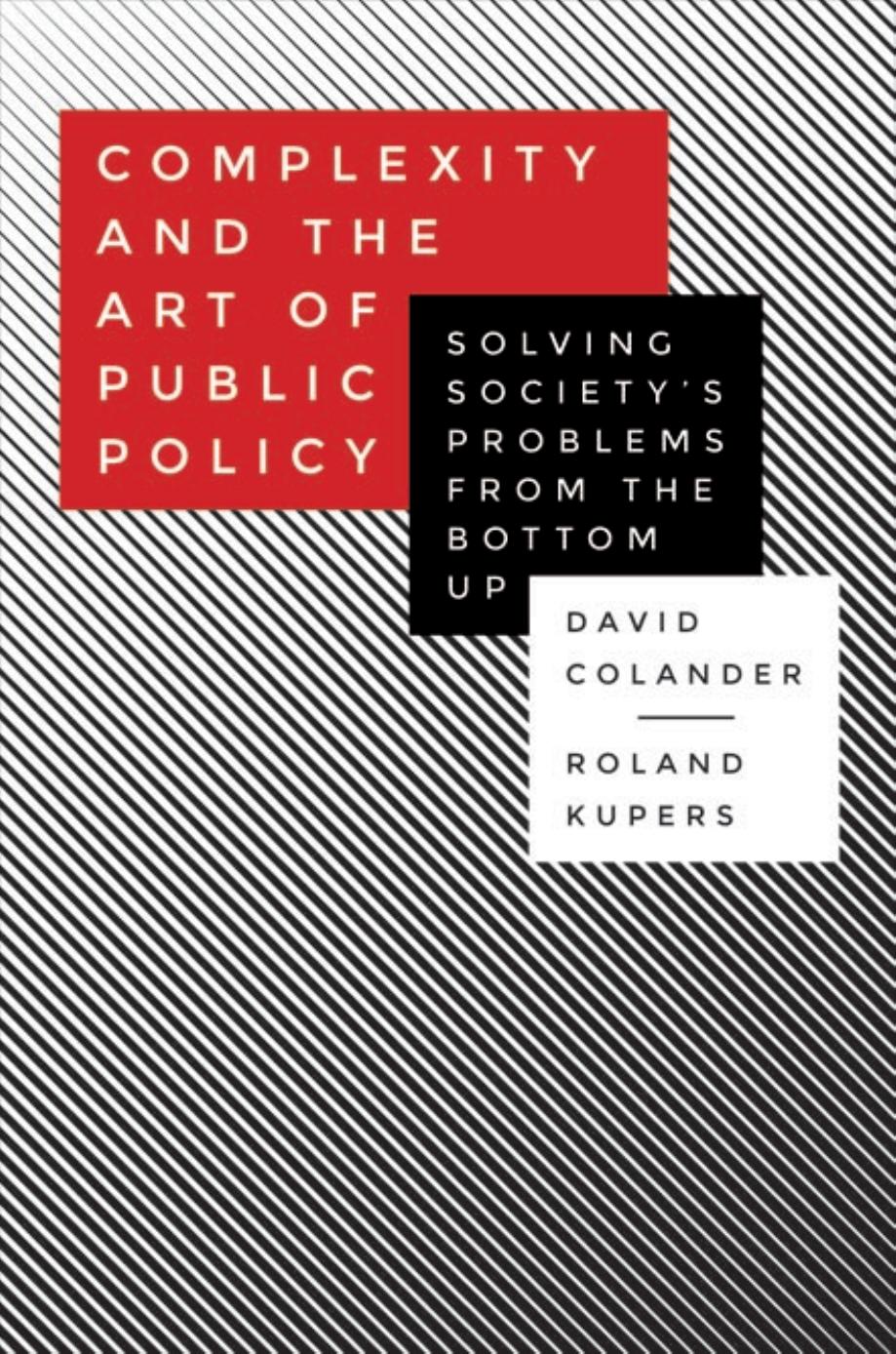Complexity and the Art of Public Policy: Solving Society's Problems from the Bottom Up by David Colander

Author:David Colander [Colander, David]
Language: eng
Format: epub, pdf
Publisher: Princeton University Press
Published: 0101-01-01T00:00:00+00:00
CHAPTER 9
Nudging toward a Complexity Policy Frame
There are idiots. Look around.
—LAWRENCE SUMMERS
Economics has both a policy branch and a scientific branch. In the last chapter we discussed the interface of complexity with the theoretical sphere of economics. In this chapter we discuss the interface of complexity with the policy sphere of economics.
The argument we are making in this book is that accepting a complexity vision of the economy changes the way one thinks of economic policy—not in a marginal way through changes at the edges, but in a fundamental way—the vision one has of the role of government, the role of the market, and how government interacts with the market. It eliminates the assuredness that economists have in their standard policy recommendations. Those standard policy recommendations might be useful at times, but complexity suggests there are other ways of looking at issues.
Economic policy thinking is slowly changing, just as theoretical and statistical thinking in economics is changing. In this chapter we discuss some of the changes that are occurring within the economics profession that are prompting these changes. An early example of such a change occurred in the antitrust case against Microsoft, when it was being sued by the government for violating the antitrust laws by using their control of the ubiquitous Windows operating system to favor their own software. Computers with Windows came preloaded with other Microsoft software, which put competitors at a disadvantage. Was this proper or not? In the standard market fundamentalist model, the basic idea was that the most efficient firm would win out, so the government should do nothing, whereas in the standard control model, because of increasing returns, government intervention was needed.
Brian Arthur’s path dependency and positive feedback analysis, discussed in the last chapter, offered a different perspective. It explains how, just though initial luck, such a standard operating system might become dominant, and prevent future competition, not because it was better but simply because it was first. It didn’t say that Microsoft was a monopolist; it simply provided a framework that could explain how Microsoft could use its control of an operating system to maintain a monopoly even though it did not prevent competition. That was a different take on antitrust than those of both standard models.
The head of the Justice Department team prosecuting Microsoft heard about this argument and found that it was useful for the case. Complexity suddenly became a highly political issue; reporters began to write about it, and in doing so they naturally wrote about Arthur and his ideas, which, following up on Waldrop’s story, made Arthur a celebrity.
KRUGMAN’S RANT
The publicity that Arthur received in the process provoked a reaction among economists who supported the standard frame, along the same lines that Waldrop’s book about complexity did to complexity scientists generally. In academia it is often not wise to be cited by the press as having new ideas; it sets in motion a reaction of other academics who believe that they have long had those ideas. The strongest of
Download
Complexity and the Art of Public Policy: Solving Society's Problems from the Bottom Up by David Colander.pdf
This site does not store any files on its server. We only index and link to content provided by other sites. Please contact the content providers to delete copyright contents if any and email us, we'll remove relevant links or contents immediately.
| Elections & Political Process | Ideologies & Doctrines |
| International & World Politics | Political Science |
| Public Affairs & Policy | Specific Topics |
| United States |
The Secret History by Donna Tartt(19045)
The Social Justice Warrior Handbook by Lisa De Pasquale(12185)
Thirteen Reasons Why by Jay Asher(8887)
This Is How You Lose Her by Junot Diaz(6874)
Weapons of Math Destruction by Cathy O'Neil(6263)
Zero to One by Peter Thiel(5786)
Beartown by Fredrik Backman(5737)
The Myth of the Strong Leader by Archie Brown(5496)
The Fire Next Time by James Baldwin(5429)
How Democracies Die by Steven Levitsky & Daniel Ziblatt(5211)
Promise Me, Dad by Joe Biden(5141)
Stone's Rules by Roger Stone(5080)
A Higher Loyalty: Truth, Lies, and Leadership by James Comey(4948)
100 Deadly Skills by Clint Emerson(4918)
Rise and Kill First by Ronen Bergman(4777)
Secrecy World by Jake Bernstein(4740)
The David Icke Guide to the Global Conspiracy (and how to end it) by David Icke(4699)
The Farm by Tom Rob Smith(4502)
The Doomsday Machine by Daniel Ellsberg(4484)
